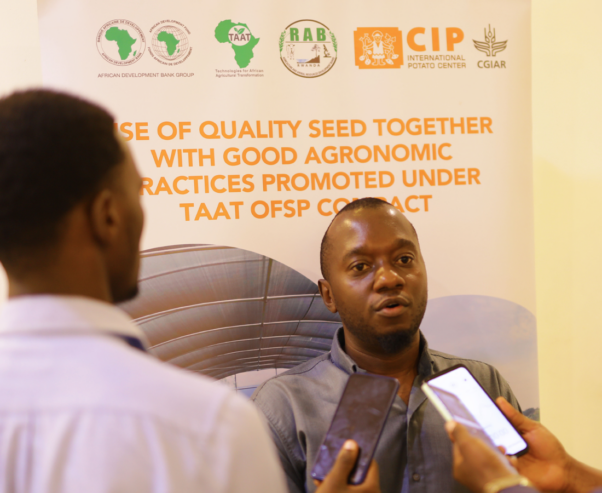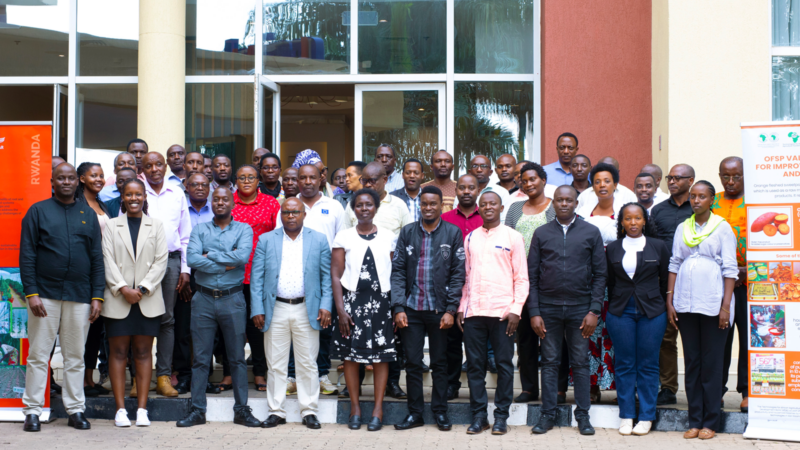 On November 28, 2024, Kigali’s Park Inn Hotel was abuzz with energy as stakeholders gathered for the Sweetpotato Roadmap Validation Workshop, a pivotal event shaping the future of Rwanda’s sweetpotato sector. Facilitated by the African Development Bank’s Technologies for African Agricultural Transformation (TAAT) program in collaboration with the International Potato Center (CIP) and Rwanda Agriculture and Animal Resource Development Board (RAB), the workshop marked a significant step in transforming sweetpotatoes into a driver of economic growth, improved nutrition, and export opportunities.
On November 28, 2024, Kigali’s Park Inn Hotel was abuzz with energy as stakeholders gathered for the Sweetpotato Roadmap Validation Workshop, a pivotal event shaping the future of Rwanda’s sweetpotato sector. Facilitated by the African Development Bank’s Technologies for African Agricultural Transformation (TAAT) program in collaboration with the International Potato Center (CIP) and Rwanda Agriculture and Animal Resource Development Board (RAB), the workshop marked a significant step in transforming sweetpotatoes into a driver of economic growth, improved nutrition, and export opportunities.
A Collaborative Effort to Shape Strategy
The workshop brought together key players from across the value chain to refine and validate the Sweetpotato Roadmap. While the roadmap provides a foundational framework to address bottlenecks in the sector, discussions during the workshop are set to shape a more detailed strategic 5-year plan. Stakeholders explored critical areas, including Early Generation Seed (EGS) systems, certified and Quality Declared Seed (QDS) production, root production, value addition, and marketing strategies.
A Unified Vision for Growth
“This marks a significant milestone for the sweetpotato sector in Rwanda,” said Jean Claude Nshimiyimana, Associate Scientist at CIP. “The roadmap outlines key interventions to address challenges and provides a framework for unified efforts. It is a critical tool that will guide our journey towards transforming sweetpotatoes from a subsistence crop to a commercially viable product.”
TAAT’s Impact on Sweetpotato Development
Laban Ahija, TAAT OFSP Value Chain Technology Transfer Officer, highlighted TAAT’s contributions to the initiative. “In Rwanda, we are collaborating with RAB to advance the Orange-Fleshed Sweetpotato Project (OFSP). This low-input crop is rich in beta-carotene, a vital precursor to vitamin A, which plays a crucial role in improving immunity and cognitive development, and highly beneficial for children under 5 and breastfeeding mothers,” he noted.
Ahija emphasized the importance of increasing awareness about OFSP as a cost-effective, nutrient-dense food source. “Our goal is to encourage adoption and expansion of this versatile crop, providing resource-limited farmers with an affordable alternative to traditional staples like maize and sorghum while exploring opportunities for value chain growth.”
Shaping the Future
The insights and contributions from the workshop will form the backbone of a robust strategic plan to guide Rwanda’s sweet potato sector for the next five years. By fostering innovation, addressing bottlenecks, and building strong market connections, the roadmap promises sustainable growth, enhanced livelihoods, and improved nutrition for Rwandans.
The Sweetpotato Roadmap Validation Workshop was not just an event – it was a testament to the power of collaboration in driving agricultural transformation. The future of Rwanda’s sweetpotato sector looks brighter than ever, with stakeholders united in their commitment to unlocking its full potential.

